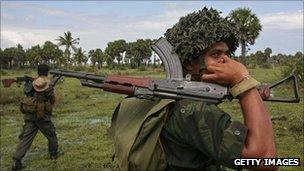UN move on war crimes report angers Sri Lanka
- Published

Both sides are accused of committing abuses in the final stages of the war
Sri Lanka has denounced the decision to submit a report to the UN Human Rights Council in Geneva accusing troops of killing thousands of civilians.
Correspondents say that the move by UN Secretary General Ban Ki-moon brings the possibility of an international inquiry into the war a step closer.
The report's conclusions on the final days of the war have angered Colombo.
The UN decision came as the largest Tamil party in Sri Lanka launched a blistering attack on the government.
The Tamil National Alliance (TNA) accused it of not telling the truth to the international community and of not keeping its own promises on post-war reconciliation.
'Misinformation'
The BBC's Charles Haviland in Colombo says the government regards the report - published in April - as having no official status.
Foreign minister GL Peiris told the Sri Lankan Daily Mirror that he would very strongly protest against the taking up of the report in Geneva.
He told another newspaper, The Island, that there was no reason at all for his country to be discussed at the current session.
However, TNA leader R Sampanthan said that the government was engaged in a "constant flow of misinformation" to the international community and was ignoring recommendations from its own war commission on issues such as the disarming of pro-government militias.
The TNA, once seen as a proxy for the Tamil Tigers, alleges that the armed forces and Sinhalese people are forcibly occupying their land while Hindu and Christian places of worship and cultural sites are being destroyed or desecrated.
The UN panel which gathered evidence into the war accused both sides of war crimes in the final stages of the conflict in 2009.
After a 10-month investigation, it concluded that "most civilian casualties in the final phases of the war were caused by government shelling".
It alleged that Sri Lankan troops shelled civilians in a no-fire zone and targeted hospitals in their push to finish off the Tamil Tigers.
The rebels were accused of holding civilians as human shields, using child soldiers and killing people who tried to leave areas under their control.
"The Sri Lankan government has been informed of the secretary general's decision to share the report with the council and the high commissioner," UN spokesman Martin Nesirky said in a statement.
"While the secretary general had given time to the government of Sri Lanka to respond to the report, the government has declined to do so, and instead has produced its own reports on the situation in the north of Sri Lanka, which are being forwarded along with the panel of experts report."
Mr Nesirky told the AFP news agency that Mr Ban had not made a recommendation calling for an international inquiry.
"The secretary general is simply sending the report. It's for members to decide how to respond to it."